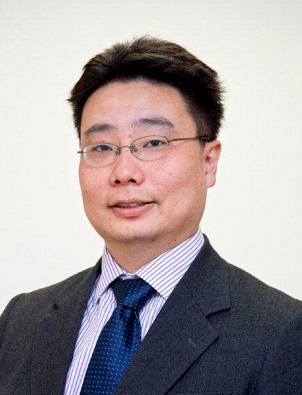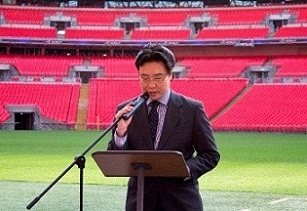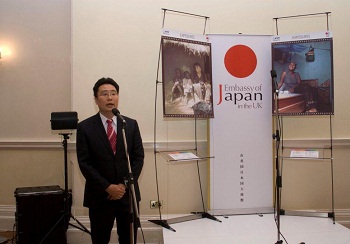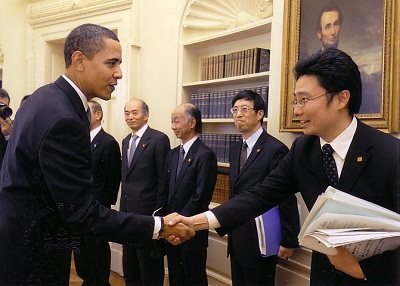| |
|
Spotlight on... Olympic and Paralympic Attaché and Deputy Director of the JICC, Daisuke Tsuchiya |
|
We recently interviewed Daisuke Tsuchiya, Deputy Director of the Japan Information and Culture Centre (JICC) at the Embassy, about his career in the foreign service and his role in London, including his particular responsibilities during the forthcoming Olympic and Paralympic Games. A slightly edited version of the conversation follows:
|
Which part of Japan are you from, and how did you spend your formative years?
I was born in Osaka, but I moved to the United States when I was one and a half. I spent six years in Chicago and six years in Los Angeles, and after that moved to Tokyo. I went to a junior high and high school in the region around Tokyo, and university in Tokyo as well. I was looking into how many times I had moved in the past, and it amounted to once every two years. So I suppose I don’t really have a base that I could call home.
So as far as your personal experience is concerned, you regard yourself as a Tokyoite rather than someone from Kansai (Western Japan)?
It’s interesting because, having spent so much time in the US, and the Japanese language that I was closest to was the language that my parents were speaking, when I moved back to Japan, my classmates in Tokyo were surprised, and they thought: “Do they talk in the Kansai dialect in the US?” And so I guess even now, when I’m talking with my parents or my brother and sister, who have spent a long time in Kansai, I fall into Kansai mode. It’s the same for me in English as well. When I’m talking to an American, my language becomes closer to American English, but I suppose I’m neither – neither British English nor American English, neither Tokyo Japanese nor Kansai Japanese.
|
 Daisuke Tsuchiya has been Deputy Director of the JICC
Daisuke Tsuchiya has been Deputy Director of the JICC
since summer 2009
|
Why did you decide to join the Ministry of Foreign Affairs?
I suppose it goes back to my experience in the US. At university I wasn’t really that conscious about entering the Foreign Ministry. I played a lot of American football for four years, and after my last season I started to think about my future. I realised what I wanted to do had its roots at what I felt as a teenager in the ’80s. Back then, Japan was very much in the news in the US. However, I found many of my classmates actually knew, in many cases, very little about Japan. So I enjoyed talking about Japan to them.
This was in high school?
Even before that, when I was 12 or 13. I had a few classmates who thought Japan was a part of China, for example! But then it made me realise that, like my classmates, I didn’t know a lot of countries myself. So I thought maybe it would be interesting to go to places I had never been to, perhaps to learn and overcome mistaken preconceptions I had about other countries. And at the same time, if I could do a job where I could play a small part in helping people to know more about Japan, I thought that might be interesting. So it had nothing to do with what I was doing in high school or university.
Tell us about the main stages of your career.
After spending one year in Tokyo, I was given two years to study in the UK, and was subsequently also given two years to work here at the Embassy in London. After that, for seven years I was in the Foreign Ministry in Tokyo working on issues ranging from US base issues in Okinawa, the Doha Round trade negotiations, to restructuring procurement policy and property management in the Ministry. And surprisingly, I was given a posting again to the UK – which I wasn’t expecting but I knew I would very much enjoy, so it was an easy decision to make to come back here. The UK was my first choice when I was initially asked straight after entering the Ministry where I wanted to go, and I feel fortunate to have been able to spend so much time here, almost seven years in total already.
|
 Embassy-supported event at Wembley stadium
Embassy-supported event at Wembley stadium
|
 JICC event at the Embassy
JICC event at the Embassy
|
I understand you have a special responsibility for London 2012. What does this role involve?
I am the Olympic and Paralympic Attaché for the Embassy, which means I wear two hats. There is my normal position in the Embassy as well as my role as part of the Japan Olympic Committee and Japan Paralympic Committee, where I will be liaising with the London Organising Committee for the Olympic and Paralympic Games (LOCOG). I’m currently doing that right now, and of course during the Games I will be very much in the Olympic Park, trying to help make things go smoothly for the Japanese team. Needless to say, the paramount objective will be to help the Japanese athletes to perform their very best. We would be grateful for as much support as we can get for these athletes. At the Embassy, we will provide information on Japanese athletes on our website. We also have a limited number of paper Japanese flags that we can provide for those who wish to cheer on Japan. Please do stop by the Embassy to collect them (up to 4 per person).
Another important goal will be to help boost Tokyo's bid for the 2020 Olympic and Paralympic Games. The Tokyo Olympics back in 1964 worked as a symbol of the recovery of Japan after WWII. If the 2020 Games are held in Tokyo, they will be a symbol of recovery from the Great East Japan Earthquake, and I hope I can play a role in promoting Tokyo’s cause during London 2012.
When you look back at your assignment in London, what will be some of your memories?
I think the very fact that I wanted to enter the Ministry was because I wanted a role where I could talk about Japan. I’m fortunate that currently I have a role where I am supposed to do precisely that. At the JICC, we have a great team of individuals who each have a particular role in cultural, academic, youth, and sports exchange, online communications, responding to public enquiries, or media relations. We are arguably the most active overseas Japanese mission in these fields. What I try to do is tie that all in. If one thinks of one event on its own, with a small audience specifically interested in a particular aspect of Japan, there’s so much effort that goes into organising such an event, be it a lecture, be it a cultural event. It makes much more sense to take that out to a larger audience, so what we try to do is to place greater emphasis on involving various disciplines in our events, so people who have previously not had in interest in Japan are also involved. We also try to improve online communication and to get more media coverage of such events, so that people who are not even actually listening to such lectures or taking part in those events can in fact hear about them, even at second hand, and hence learn a bit more about Japan.
Probably one of the most difficult occasions was after the Great East Japan Earthquake last March. We had a large number of interview requests from the BBC and other media organisations, and I personally took about 30 in the first week. It was not easy to discuss a disaster that had resulted in such immense suffering. In the immediate aftermath, we didn’t have press guidelines, but it was important to swiftly provide as much information as possible. One other point I tried to emphasise in the interviews was our gratitude for the outpouring of support that was shown by the British people towards those afflicted. The support demonstrated by so many in the UK in so many different ways was widely reported and appreciated very much in Japan, so it was important to let people here know about that.
Was the lack of press guidelines due to the disaster being so unprecedented that you just had to think on the hoof?
Yes. And the situation kept changing, so that even if there had been guidelines, these would have had to be changed minute by minute anyway. So, in reality you simply had to rely on your common sense and go by the basic principle that you would provide as much information as quickly as you could, so far as you could, at any given stage.
What do you like to do in your spare time?
I have to say, I like to eat! I’m fond of all varieties of food, from the savoury to sweet, and especially food that is filling, but my favourite has to be extra-hot Chicken Vindaloo. I came back here three years ago, and the very first day I remember proclaiming that I was going to lose at least 10 kilos, but I’ve probably gone in the other direction! But, yes, I’ve found that the food in London is very good, and I enjoy it very much.
In addition, sports have always been a favourite pastime for me. Unfortunately I am in no shape to play American football myself as I used to, but I do enjoy going to watch all sports, be it rugby league or union at Wembley, cricket at Lords, or football at The Emirates.
We also like to travel. I think this time round I would have liked to travel even more. There’s so much to see in the UK and in Europe as a whole, as well. But of course, you can’t always have everything! I have a certain dilemma every time I do talks about Japan where I am supposed to emphasise what a great place my country is. Because my enjoyment from being in the UK is so strong, it takes the edge off my conviction that Japan is the place to be! The history, architecture, parks and most of all the people of the UK make it such an attractive place to be.
If you hadn’t joined the Ministry of Foreign Affairs, what do you think you might have done instead?
Well, I suppose I enjoy going to different countries, finding things that are new and trying to communicate that to other people, so any job that involved that would have been good for me. One of the roles I played part-time during my time at the Foreign Ministry in Tokyo was working as an interpreter. For example, when I was doing the Doha Round trade negotiations, two or three times a week I would be called by the Prime Minister’s Office to go into his office and interpret for him for a meeting with a foreign leader, to discuss maybe Japan’s assistance to Africa for an hour or two, then go back to my usual job. When the Prime Minister travelled abroad, I would go with him and be his interpreter for those three to four days, perhaps for a meeting about security in Asia, then come back to Japan to work on trade issues again. I did this for four Prime Ministers. The travelling and variety in work were quite interesting!
|
 |
That said, most of the memories I have from that time have nothing to do with the interpreting itself. There was one occasion at a G8 summit where only the leaders and their interpreters were allowed in. All the other interpreters were let in, but for some reason the guards decided to stop me. I tried to reason with them but I suppose my face was not trustworthy enough and, despite my identification card, they did not listen. I had a job to do so I resorted to trying to get through anyway, but one of the six-foot-five guards stopped me with a bearhug. In the end, I was able to get through only with some personal help from my Prime Minister. I hope that doesn’t happen during the Olympics! |
| |
JICC |
|
|
| Top |
|
| |
|
|
|
|
| |
|  |
|

